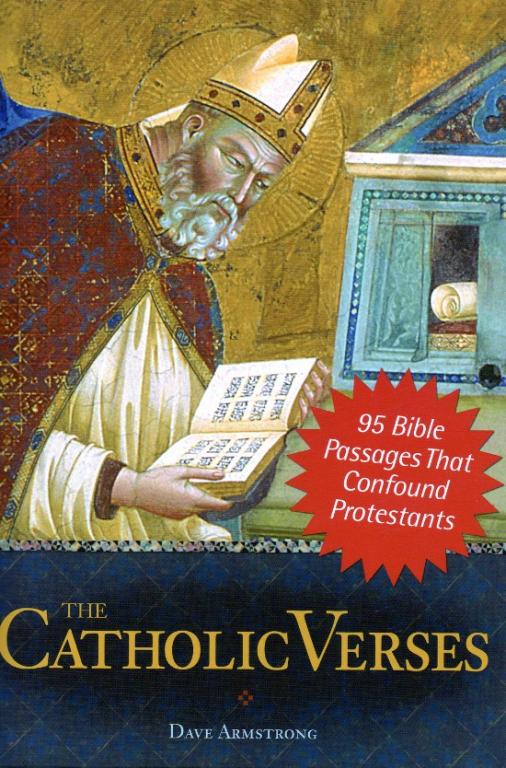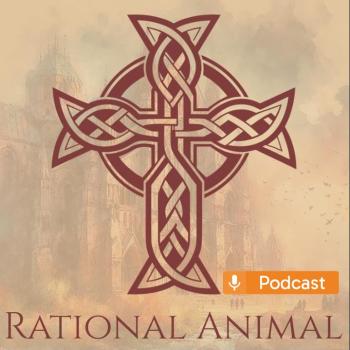
[from my 2004 book, The Catholic Verses: 95 Bible Passages That Confound Protestants]
1 Corinthians 15:29 [RSV] “Otherwise, what do people mean by being baptized on behalf of the dead? If the dead are not raised at all, why are people baptized on their behalf?”
Many Protestant commentators (I will provide examples shortly) think this is one of the most obscure passages in the New Testament, even the single most mysterious passage. As such, it is particularly relevant for our study. St. Francis de Sales (1567-1622), the great Catholic apologist and Doctor of the Church, exegeted this passage in the following way (which would be quite sufficient to make any Protestant very uneasy):
This passage properly understood evidently shows that it was the custom of the primitive Church to watch, pray, fast, for the souls of the departed. For, firstly, in the Scriptures to be baptized is often taken for afflictions and penances; as in St. Luke chapter 12 [12:50] . . . and in St. Mark chapter 10 [10:38-39] . . . in which places Our Lord calls pains and afflictions baptism [cf. Matthew 3:11, 20:22-3, Luke 3:16].
This then is the sense of that Scripture: if the dead rise not again, what is the use of mortifying and afflicting oneself, of praying and fasting for the dead? And indeed this sentence of St. Paul resembles that of 2 Maccabees 12:44: It is superfluous and vain to pray for the dead if the dead rise not again (St. Francis de Sales, The Catholic Controversy, translated by Henry B. Mackey, Rockford, Illinois: TAN Books, 1989, from the 1886 edition [London and New York]; originally 1596, p. 368).
With this Catholic explanation in mind, I will try to provide some insight into the way some Protestants interpret this passage, by recalling a fascinating, enjoyable Internet dialogue I recently had with six Protestant opponents. I will give the highlights, as an example of what Protestants try to do when they are confronted with a biblical text that cannot be harmonized with their theology.
One person argued that here Paul was showing the inconsistency of a literal practice of baptizing people on behalf of others who had died. I replied that the context falsified this interpretation. St. Paul’s statement, whatever it means, is used as a rhetorical argument favoring the resurrection of the dead, not as an anomalous, incongruous example within the context of a positive affirmation of resurrection.
The whole of chapter 15 deals with Jesus’ Resurrection and the resurrection of His followers. St. Paul’s point is that the Christian life of toil and suffering is pointless if there is no resurrection and if Jesus Himself did not rise again (15:14, 17, 19), in which case we might as well be hedonists (15:32). After he makes his statement in 15:29, he proclaims in the next verse: “Why am I in peril every hour?”
In other words, “Why do I go through what I go through, if not for the hope of the resurrection and eternal life? [cf. 15:32]?” His example of baptism was one of several practices that make sense only if there is a resurrection. By analogy, then, it is not presented as an inconsistency at all, but as an acceptable practice in light of the resurrection, just like his “peril” and dying “every day” (15:31).
A second person suggested that this passage was talking about those who had been so impressed by Christian martyrs that they decided to become believers and get baptized. Another denied that there was any such practice going on, whatever it was. He thought that the passage meant that believers were identifying in baptism with a dead man — Jesus Christ — and were “dead to the world but were alive to Christ.”
This latter interpretation fails utterly, I think, because the passage doesn’t say we were baptized in Christ or with Him, as other baptism passages suggest; rather, it says people are baptized on behalf of the dead — an entirely different concept. Obviously, our Lord Jesus needs nothing done on his behalf. Secondly, “the dead” seems to me to be a corporate term, not referring to Jesus alone. It would be exceedingly strange to refer to Jesus as “the dead.” Thus, linguist Joseph H. Thayer informs us that the use of the Greek nekros in this verse is a plural application, referring to “the dead” as a group (Thayer, 423).
This interpretation is also contradicted throughout chapter 15, because when Paul refers to Jesus, he repeatedly uses the title, “Christ” (15:3-4, 12-17, 20), whereas “the dead” clearly refers to the resurrection of us poor, miserable created human beings (in contradistinction to the resurrection of Jesus Christ, e.g., 15:12-13, 15-16, 52). The distinction between the two could not be clearer, with Paul often contrasting them in the very same verse.
My opponent did not deal with any of these points. He just insisted that I was “begging the question” – engaging in circular reasoning. He continued protesting in this fashion and graciously offering me lessons in elementary logic, but I kept to exegesis and hermeneutics. I contended that my notion fit in perfectly well with the schema of the chapter because Paul was making a rhetorical argument having to do with the fact that there are folks who are resurrected and alive in the afterlife. We could paraphrase his rhetorical question: “Why do something for their sakes if they are not there in the first place?” That made perfect sense to me.
But my friend suggested an awkward reading of the phrase “the dead” and tried to apply it to Jesus’ Resurrection, even though Paul everywhere else in the chapter used it as a term for the dead generally speaking, and contrasted it to Christ several times. I suggested that this indicated exegetical desperation on his part.
He appealed to Calvin’s commentary to support his argument, but he would not respond to my critiques. (Why have the discussion in the first place, then, I wondered?) I consulted Calvin and found that he did not say that “the dead” refers to Christ, which was a major component of my friend’s position.
One of the basic mistakes was that everyone was assuming that St. Paul was referring to water baptism, when it is not necessary to do so simply by virtue of the word baptism, which has a few different meanings in Scripture. Biblically, and in Catholicism, it is nonsensical to be water-baptized for someone else, because (for Catholics, Orthodox, and several species of Protestants such as Lutherans, Anglicans, Church of Christ, and so forth) it confers regeneration, and a dead person is either regenerate or not, beyond the help of the earthly sacraments.
No “proxy baptism” will change that fact after they are dead. Even if one denies baptismal regeneration, “proxy baptism” makes no sense because the power and graces conferred by baptism apply only to the one receiving them.
What does make sense, though, is the “penitential” interpretation (expressed by St. Francis de Sales above), because that easily harmonizes with the parallel passage in Maccabees about prayer for the dead. The problem here is that Protestant theology has no place for such thought, and so it is ruled out from the outset. Thus, the text remains mysterious for Protestants because of, in this instance, the false preconception they bring to it. I opined that it would be better for Protestants simply to admit ignorance about the passage than to special plead in order to avoid at all costs a “Catholic” interpretation.
This was how the discussion went. There was no true constructive interaction. They gave their exegesis; I gave mine. I critiqued theirs but they would not follow up my criticisms in any significant or in-depth fashion. My Protestant friends scarcely even tried to argue against my interpretation at all; the one person simply declared it worthless and logically circular. He appealed to Calvin, but I showed how his view contradicted Calvin at a crucial point. So it often goes in Catholic-Protestant discussion.
Calvin’s own take in his Commentaries is rather implausible, in my opinion:
[T]o be baptized for the dead will mean — to be baptized so as to profit the dead — not the living . . . [I]f a catechumen, who had already in his heart embraced the Christian faith, saw that death was impending over him, he asked baptism, partly for his own consolation, and partly with a view to the edification of his brethren . . . They were, then, baptized for the dead, inasmuch as it could not be of any service to them in this world, and the very occasion of their asking baptism was that they despaired of life.
In other words, Calvin would apply the “baptism for the dead to the individual’s own death (that is, the one who is baptized), as he is about to die, and the baptism therefore applies mostly to the dead.” This might make some sense insofar as we do things which affect our life hereafter, but this interpretation is very strained, given the language of the passage. Calvin obviously resorts to this forced explanation because for him, it makes no sense for baptism to apply to anyone other than the one receiving it. St. Francis de Sales’ suggestion that other types of baptism are here referred to is much more plausible.
Other well-known Protestant commentators offer no more light. Matthew Henry says that the verse is a “very obscure passage, which, though it consists of no more than three words, besides the articles, has had more than three times three senses put on it by interpreters.” Albert Barnes observes: “There is, perhaps, no passage of the New Testament in respect to which there has been a greater variety of interpretation than this; and the views of expositors now by no means harmonize in regard to its meaning.“
He outlines five major schools of thought, but none of them includes the Catholic interpretation, as given above by St. Francis de Sales. Adam Clarke also considers it a puzzling verse (but arguably it is mostly so because of Protestant theological presuppositions):
This is certainly the most difficult verse in the New Testament; for, notwithstanding the greatest and wisest men have laboured to explain it, there are to this day nearly as many different interpretations of it as there are interpreters . . . a vast number of discordant and conflicting opinions.
After offering about eight internally inconsistent and implausible thoughts on the passage, he gives his own tentative reading (equally as untenable as Calvin’s):
[A]s they receive baptism as an emblem of death in voluntarily going under the water, so they receive it as an emblem of the resurrection unto eternal life, in coming up out of the water; thus they are baptized for the dead, in perfect faith of the resurrection.
This verse offers a classic example of Protestant confusion and incoherence in the face of a biblical passage that appears to be utterly at odds with Protestant theology.
***
NOTE (8-27-19): Be sure to also read the long comment by Adrian Combe in the combox below (if it doesn’t link for you, do a word search of his name). It explains Greek tenses and how they relate to the different meanings of baptism in Scripture. The linguistic argument from Greek tenses confirms the argument I used from St. Francis de Sales, whereby the word in 1 Corinthians 15:29 is referring not to water baptism, but rather, to suffering or “baptism of fire”.
***

















